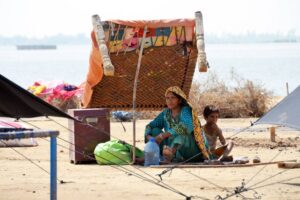
Due to climate change, the Pashtun-dominated areas of Baluchistan are confronted with severe drought that has forced several families to move to other parts of the country, affecting women’s lives specifically.They say, on the one hand, there is inflation and unemployment, and on the other hand, most of the monthly income is spent on purchasing water from local water tank contractors.
Talking to JFHR locals said that drought has badly affected agriculture and livelihood in Loralai, Pashin, and Dukai districts of Baluchistan. Residents of Loralai say that there has been no beneficial rain for the past two decades; that’s why agricultural activities have been halted, and people have migrated to other areas of the province.
Ata-U-Rahman, a local resident, says that he has 20 family members, and every month struggles to arrange money for buying water. “Every month I spend 15 to 20 thousand rupees on water, and this issue is getting complicated with each passing day,” he added.
Talking to JFHR locals said that drought has badly affected agriculture and livelihood in Loralai, Pashin, and Dukai districts of Baluchistan
Naaz Gul, a resident of Dukai district, shared that the shortage of potable water has made people’s lives difficult. She said, “Every second house here is facing this issue. The people are very poor, and there are nine of us in our house, and I bring water for them three times a day in big pots, relying on the house where I work as a domestic helper, as they possess a drill. This is my situation as well as others here.”
Yet, the impact of this demanding routine goes beyond mere physical exertion. Naaz Gul carries the emotional scars of her sacrifice, enduring a miscarriage due to the strain of fetching water in heavy containers. The weight of her burdens isn’t just about the volume of water she carries; it’s visible in the pain etched on her face, a silent testament to the toll of water scarcity on human lives.
As she faces the daily hurdles, Naaz Gul confronts heart-wrenching decisions, forced by circumstance rather than choice. With limited means at her disposal, she grapples with the difficult choice of pausing her daughters’ education. Unable to afford the luxury of washing their uniforms amid water scarcity, she must prioritize essentials over aspirations, a stark reminder of the trade-offs forced upon families by the climate crisis.

“Ahmadullah, a local, says that if there are no rains, the majority will not find water to drink. He said, “The water has gone very low; it used to be 200 feet, and now the water level has gone to about 1,000 feet underground. Only those people who have resources can drill, and those who don’t have money are forced to migrate to big cities.”
Quetta, the capital city of Baluchistan, is also facing severe shortages of drinking water, and people are spending a lot of money and effort to arrange water for their families. Sher Muhammad Khan, a water tanker owner in Quetta, says that they have increased the prices because of the ongoing inflation and rise in fuel prices in the country.
Afsana, a 16-year-old girl whose journey mirrors the struggles faced by many young women in the region. Two years back, Afsana had to say goodbye to her school and friends in Pishin. It was a tough call for her family to move to Quetta because of the shortage of water. Her father, who already had a small job in the city, couldn’t manage the family back in the village alone, as there were no other male family members. “At our village home, we women used to stay without a male member as my father used to stay in Quetta for his job; there weren’t any other men to fetch water, and us women weren’t allowed to step out to get it.
My mom used to lock up the water pots, worried that we might waste this precious resource,” Afsana recalls. Initially, the idea of living in a bigger city seemed exciting, but it came at the price of leaving behind her education and friends. In Quetta, the challenges only seemed to multiply. With limited resources and no means to continue her education in the bustling city, Afsana’s dreams of academic success were put on hold. Instead, she found herself shouldering the responsibilities of household chores alongside her mother, while her brother was prioritized for schooling.
In our Baluchistan, about 5145 tubewells, 2250 wells, and about 3000 water springs were dried up; however, the government has no plan to alleviate people’s suffering.”
It merits a mention that agriculture is the main source of income for the local communities; however, the last two decades of continuous drought have forced them to stop working on their fields and to relocate to other areas. Abdul Rahman Bazi, General Secretary of the Baluchistan Farmers’ Organization, says that he had conducted a survey in 2015, and according to it, the drought had caused at least 600 billion rupees in losses to the province. He said, “In our Baluchistan, about 5145 tubewells, 2250 wells, and about 3000 water springs were dried up; however, the government has no plan to alleviate people’s suffering.”
Experts believe that climate change has badly affected the intensity of rainfall in the region and has caused damage to the natural flow of water. The newly elected Chief Minister Sarfaraz Bugti has yet to form his cabinet; however, Noor Muhammad Dumar, the former minister for irrigation, says that the government had already built dams to save water in the province, but there has been no rain for a long time. He said that he understands the problems of the farmers and hoped that the new government will find some solution to the problems of the local communities.
